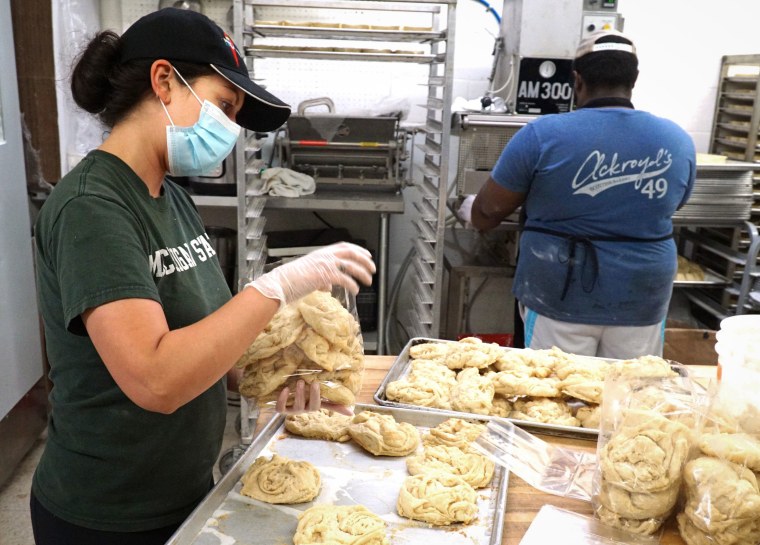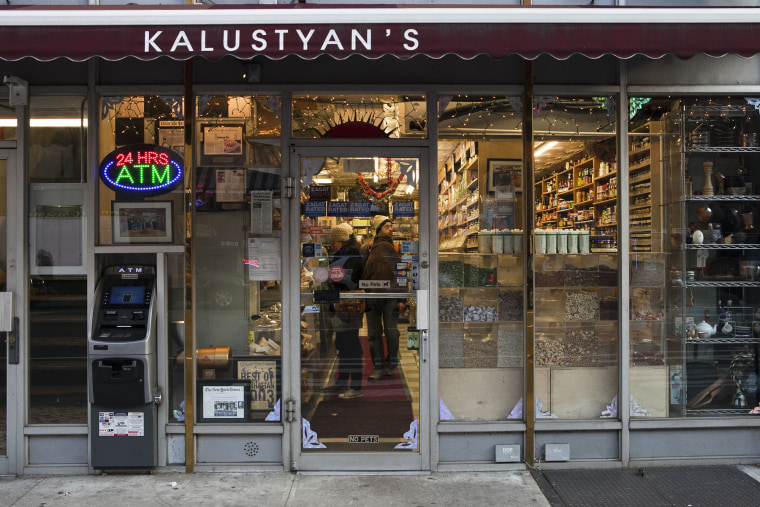Donald Trump, the incoming president, has not wasted any time in announcing that tariffs will be a top priority on the first day of his presidency.
Less than two months before his inauguration, small firms are already taking precautions against anticipated cost hikes, or considering whether to absorb the financial burden or pass it on to consumers.
Trump declared on Truth Social on Monday that he will impose 25% tariffs on all Canadian and Mexican imports in addition to a 10% tax on Chinese goods.
He didn’t restate his demands for universal import taxes while on the campaign trail, and some analysts believe his suggested trade restrictions will be challenged in court. Small firms that had anxiously watched the plans during the campaign, however, believe that time is running out to shelter themselves as much as possible despite the uncertainties.

Beatrice Barba is the owner of Tabor Place, a company that produces kid-friendly lunchboxes and nontoxic cups in the San Francisco Bay Area. In 2025, she had planned to create new designs for her iconic sippy cups, but she is now abandoning those plans and hoarding as much of her basic inventory as she can.
When she started the company around six years ago, she approached 80 local manufacturers, but none of them were able to produce her borosilicate glass designs, thus her whole product line is created in China.
Barba was somewhat concerned about Trump’s proposed tariffs, but she didn’t think he would win and she didn’t think he would be committed to enforcing them if he did.
She hopes that before Trump takes office, her Chinese suppliers will be able to produce a single $200,000 order for the entire year and ship it via American ports in the coming months.
She said, “That gives me a little time to weather the storm.” “I am extremely anxious, and there is a sense of urgency.”
Tariffs are generally disliked by economists because they tend to raise consumer costs, something many business leaders are already warning about. Small company owners who survived Trump’s initial wave of levies told NBC News last month that they had found it difficult to adjust, with many citing fewer alternatives than their bigger competitors for absorbing cost increases. If fully enforced, Trump’s proposed new slate of tariffs would be significantly more extensive and higher.
In a statement, Trump transition spokesperson Karoline Leavitt said, “President Trump implemented tariffs against China during his first term that generated employment, investment, and no inflation.”
By reshoring American jobs, reducing inflation, increasing real wages, lowering taxes, reducing regulations, and unleashing American energy, President Trump will act swiftly to repair and restore an economy that prioritizes American workers [first].”
Although Wall Street is doubtful that the next administration will fulfill all of its trade pledges, analysts generally disagree.
Researchers at S&P Global Ratings stated in a report on Tuesday that “if taken at face value, Trump’s campaign policy proposals could lead to lower growth in the medium to long term and higher inflation in the near term.”
However, S&P analysts said that tariff effects on energy markets alone may convince the future president to compromise. They also noted that some analysts saw his most recent proposal as “classic Trump,” a bargaining strategy that shouldn’t be taken literally.
However, a large number of small company owners are not taking any chances.
After the election, brewer Chris Smith sent an email saying, “I’m much more worried now, sadly.” Last month, Smith, who owns the Virginia Beer Company in Williamsburg, Virginia, said that since Trump imposed 25% levies on steel in 2018, he has been paying an additional $1,000 year for tap handles. He is now speeding up the acquisition of a grain silo and maybe a stainless steel fermentation vessel from China.
Smith stated that he typically adds a tank to his brewery every year, which can cost up to $30,000. In an effort to bargain with brokers, he is also keeping an eye on the price of aluminum cans.
The owner of Bobo Design Studio, a small stationery business in Palm Springs, California, Angie Chua, is already looking for methods to cut expenses in case they increase.
Chua produces a trip diary, her distinctive product, in China, whose exports Trump has threatened to impose 60% tariffs on. Chua said she was unaware of Trump’s desire for such hefty tariffs on Chinese imports until she talked with NBC News last week, prior to his latest statement. “It would be the final nail in our coffin,” she stated. “The sixty percent is terrible.”

Chua stated that switching to domestic suppliers would be unaffordable and that she does not have the money to put a sizable order up front following a difficult year for Bobo’s e-commerce sales. In order for customers to know what the pricing used to be, she is currently thinking about placing a tariff fee as a line item on her items.
Echoing some of the hesitancy among market watchers, Chua continued, “We’ll cross the bridge when we get there.” “How can you forecast a person who is notoriously erratic? How can you possibly predict that?
According to Hadley Douglas, who co-owns the Urban Grape wine boutique in Boston with her husband, TJ Douglas, consumers may concentrate on imported items when evaluating how tariffs effect the prices they pay, and domestic sectors will also be impacted.
Because she is required by law to distribute wine to her stores, she collaborates with wholesalers. According to Douglas, smaller distributors may not be able to stay in business if the cost of wines from South America or Europe rises. However, the same wholesalers also ship domestic wines over state boundaries, so it may be difficult for American wineries to get their bottles on store shelves.
“It will burn slowly,” Douglas said. As the first domino to fall, it will begin at the smaller, family-owned distribution level. Their margins are really narrow.
Douglas fears losing clients as a result of boosting prices to offset the expense of prospective tariffs. She and her spouse are members of the Small Business Council of the U.S. Chamber of Commerce, which consists of around 100 business owners from a variety of industries who rarely agree on anything. “Everyone is against tariffs, so they are the exception,” she remarked.
Some big firms already have plans to expedite purchases or stockpile goods, but not all businesses have the funds available to do so. In order to make sure his Easter chocolate purchase comes on time, Joe Hakim, general manager of Ackroyd’s Scottish Bakery in Redford, Michigan, is delaying his order until October. However, he is concerned that the price may increase due to impending tariffs, so he chose not to take the chance.
Hakim has considered shipping Ackroyd’s goods to Canada, which is only a 30-minute drive away, but it seemed unsafe as well.
“The retaliation that could happen in shipping even to Canada, who is an amazing partner of ours, puts us at a disadvantage,” he stated. “It’s really overwhelming how much you can lose yourself in when you think about the worst-case scenarios.”
According to Hakim, specialty shops like his have cultural significance as well. Scottish and other British foods that are difficult to get in the United States are sold at his bakery. Kalustyan’s, a New York City institution that has been selling spices, dried fruits, legumes, and other specialties from the Middle East and South Asia since 1944, attracts consumers for essentially the same reason.
Aziz Osmani, a co-owner of Kalustyan, stated that he is thinking about tariffs and is ready to bargain with suppliers or find other options if necessary. Although he never wants to raise rates for products that few rivals sell, he occasionally has no other option. His clients range from restaurants to residences.
“The foundation of our identity is our wide variety of international products,” Osmani stated. “People like us are always impacted by cost increases.”
Some small company owners see a bright side to tariffs, but the majority are not hopeful. The proprietor of the eco-friendly hair care line Dip, Kate Assaraf, manufactures all of her cosmetics in the United States. Though she isn’t very concerned, she anticipates that her Chinese-made accessories may suffer.
Assaraf stated, “I believe it’s a chance for people to reconsider consuming so much.” She advises clients to look for her items at nearby boutiques since she has never sold on Amazon.
“With Dip, we constantly shout into the universe to buy better stuff and buy less of it.”





